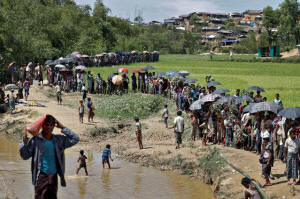|
Bangladesh, Myanmar agree to draw up plan
for refugee repatriation: minister
 Send a link to a friend
Send a link to a friend
 [October 02, 2017]
By Ruma Paul [October 02, 2017]
By Ruma Paul
DHAKA (Reuters) - Bangladesh and Myanmar
agreed on Monday to set up a "working group" to plan the repatriation of
more than half a million Rohingya Muslim refugees who have fled to
Bangladesh to escape an army crackdown, the Bangladeshi foreign minister
said.
The United Nations has called the exodus of 507,000 Rohingya since late
August the world's fastest-developing refugee emergency, and says
Buddhist-majority Myanmar is engaging in ethnic cleansing against its
Rohingya Muslim minority.
Myanmar denies that. It says its forces are battling Rohingya
"terrorists" who triggered the latest wave of violence with coordinated
attacks on the security forces on Aug. 25.
Myanmar says more than 500 people have been killed since, most of them
insurgents, whom it has accused of attacking civilians and setting most
of the fires that have reduced to ashes more than half of more than 400
Rohingya villages in the north of Rakhine State.
Bangladesh Foreign Minister Abul Hassan Mahmood Ali said he and Myanmar
official Kyaw Tint Swe had agreed in their talks to set up the working
group to draw up plans for repatriation.

"We are looking forward to a peaceful solution to the crisis," Ali told
reporters.
Kyaw Tint Swe did not speak to the media and government spokesmen in
Myanmar were not immediately available for comment.
Waves of Rohingya have taken refuge in Bangladesh over the years
complaining of persecution, in particular in the late 1970s, the early
1990s and in October last year, following smaller insurgent attacks on
the security forces.
The neighbors have agreed on repatriation plans before, but the
fundamental problem - the status of Rohingya in Myanmar - remains
unsettled.
The Rohingya are denied citizenship and classified as illegal
immigrants, despite claiming roots in Myanmar that go back centuries,
with communities marginalized and subjected to bouts of communal
violence over the years.
Problems of statelessness had to be tackled, U.N. High Commissioner for
Refugees Filippo Grandi told a meeting in Geneva.
"Nowhere is the link between statelessness and displacement more evident
than with the Rohingya community," he said.
RECOMMENDATION ON CITIZENSHIP
The crisis over the treatment of the Rohingya is the biggest problem
Myanmar leader Aung San Suu Kyi has had to face since forming a
government last year after winning a landmark 2015 election.
The Nobel peace laureate, in an address to the nation last month, said
Myanmar was ready to start a verification process under a 1993 agreement
with Bangladesh and "refugees from this country will be accepted without
any problem".
But many refugees are gloomy about the prospects of going back, fearing
they will not be able to furnish the documents they anticipate Myanmar
will demand to prove they have a right to return.
Myanmar has refused to grant access to a U.N. fact-finding mission but
Suu Kyi last year appointed a team led by former U.N. secretary-general
Kofi Annan to draw up recommendations on solving problems in Rakhine.
[to top of second column] |

Rohingya refugees queue for aid in Cox's Bazar, Bangladesh, October
1, 2017. REUTERS/Cathal McNaughton

The commission presented its recommendations on Aug. 24, a day
before the insurgent attacks, among them a review of a law that
links citizenship and ethnicity and leaves most Rohingya stateless.
The panel also recommended that the government punish rights
violations, ensure the right to freedom of movement and invest in
infrastructure to lift the state out of poverty.
Suu Kyi, in her address to the nation last month, said she was
committed to the recommendations.
There were already about 300,000 Rohingya refugees in Bangladesh
before the latest exodus.
'GHOST TOWN'
In Myanmar, the government took diplomats to Rakhine to let them see
the situation.
"Maungdaw feels like a ghost town," Swiss ambassador Paul Seger said
on Twitter, as he arrived in a main town in the north of Rakhine.
Myanmar has blocked most aid workers and the media from the area,
despite calls from Western countries for access to deal with what
aid groups fear is an unfolding humanitarian crisis.
The diplomats were also due to be taken to the Rohingya village of
Ah Nauk Pyin, which Reuters reported last month was cut off and
threatened by hostile Rakhine Buddhist neighbors. An itinerary of
the trip referred to the report.
Suu Kyi has been accused by Western critics of not speaking out
strongly enough on behalf of the long-persecuted minority and of
defending the army action.

She has no power over security policy under a military-drafted
constitution and the public in Myanmar, where Buddhist nationalism
has surged over recent years, is generally hostile toward the
Rohingya.
The United States, in its strongest criticism of Myanmar over the
crisis, called last week on countries to suspend providing weapons
to Myanmar's military. But it stopped short of threatening to
reimpose sanctions.
A small protest against Western pressure and foreign media coverage
was held in Myanmar's biggest city of Yangon.
A message on one banner accused the United States, Britain and
others of nuturing Islamic domination in Asia "for their vested
interest to beat China and India".
(Additional reporting by Stephanie Ulmer-Nebehay in GENEVA; Writing
by Robert Birsel; Editing by Nick Macfie and Clarence Fernandez)
[© 2017 Thomson Reuters. All rights
reserved.]
Copyright 2017 Reuters. All rights reserved. This material may not be published,
broadcast, rewritten or redistributed. |